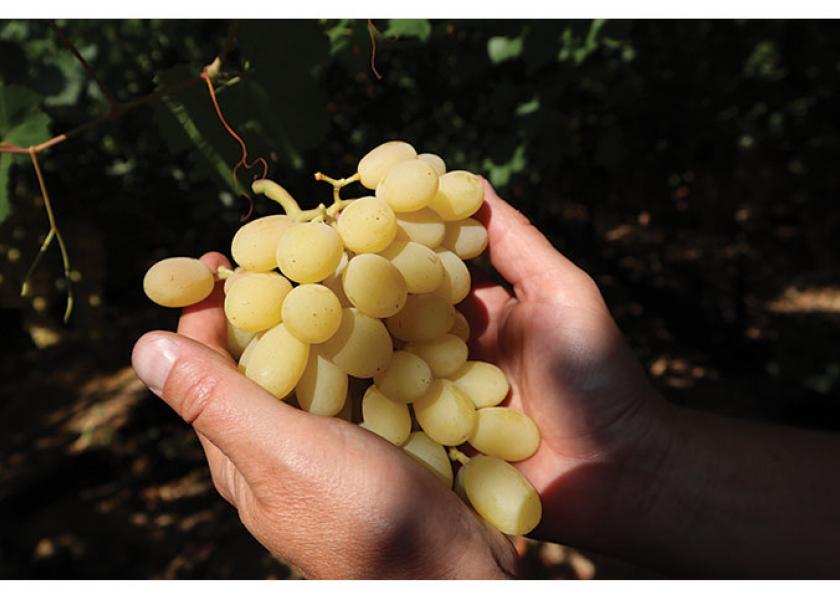Sustainability, conservation play role in grape vineyards

Whether it’s out of concern for the land, the people or the environment, many California table grape growers have adopted sustainable growing and business strategies to guide their vineyards into a productive, profitable and ecologically sound future.
Pandol Bros.
When it comes to getting the bugs out of its operation, Delano, Calif.-based Pandol Bros Inc. is full of innovative ideas.
While its neighbors typically pull out acreage after a crop cycle is finished and immediately go back in for the next planting, Pandol Bros. sets aside some acreage, planting annual crops to provide habitat for upland game birds.
“We tend to leave land fallow for two to three years,” said John Pandol, special projects director.
“On our fallow land, we strategically plant annual and native crops for migratory water fowl and local birds,” he said.
The practice allows the land to rest, provides a habitat for birds and at the same time helps control the vineyards’ bug population.
“Birds eat insects,” Pandol said.
The process doesn’t stop there.
The annual plants suck up carbon and nitrogen from the atmosphere, and at the end of the season, the plants are worked into the ground.
“When we plant that land, we have better soil,” Pandol said.
The program doesn’t add a lot of additional cost, he said.
Most of any negative cash flow would be in the lost opportunity of not actively farming.
But on the plus side, over the years, the plan results in better quality soil.
Pandol Bros. also uses beneficial insects to combat bad bugs that can attack its vineyards.
“In the late 1970s or early 1980s, we planted some rows of blackberries for habitat for beneficial insects,” Pandol said.
They’re still there.
“We haven’t populated it for years, either with a predator for a specific pest or a broad spectrum predator like lady bugs,” he said. “The beneficial insect habitat has been there for 40 years.”
Some efforts to control insects can have drawbacks, he said.
“Spiders are actually a really great biological control,” he said.
The problem is, they can be a safety hazard for workers, and sometimes they end up leaving the field in the bags with the grapes.
Sunview Marketing
Delano, Calif.-based Sunview Marketing International would prefer to use the term “stewardship” than descriptors like sustainable or environmentally friendly, said Mitch Wetzel, vice president of sales and marketing.
Stewardship involves the land itself, the company’s associates, many of whom have been with the firm for many years, and the water, he said.
The environment and energy are “tangential pieces” that also are of concern.
Now more than ever, it’s important to make sure that the company’s longtime associates who have invested a lot of time and dedication feel safe, that Sunview is producing a safe product, and that “everybody continues to be positive no matter how tough the circumstances can be,” he said.
When it comes to stewardship, the company’s ownership and management teams focus on what is going to make the most long-term sense, Wetzel said, whether it’s water conservation measures, efficient land use or ways to train and invest in people so that they will have long professional careers within the company.
A stewardship program must be made up of several different pieces to be effective, he said.
“If it’s one dimensional, it’s not going to work.”
The company, for example, has its office and cold storage area covered with a solar array, it has an extensive integrated pest management program and is one of the largest organic grape producers, Wetzel said.
“It’s all pieces,” he said. “It’s not one big thing that makes you a good steward. It’s got to be a lot of things.”
Top Brass Marketing
Top Brass Marketing Inc., Bakersfield, Calif., is into energy conservation, said Brett Dixon, president.
“We currently have 5 acres of solar panels that run 1 megawatt of electricity that offsets approximately 80% of our energy use at our cold storage facility,” Dixon said, “further committing to a sustainable future here at Top Brass.”
Related content:
California black grapes find a niche
California grape varieties proliferate
New grape varieties enhance retail sales
Coachella Valley grapes off to late start








